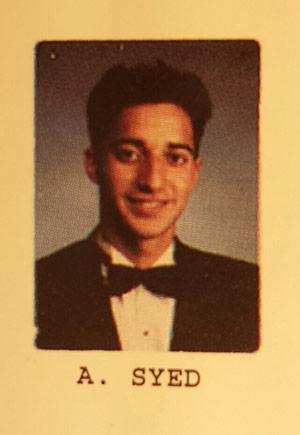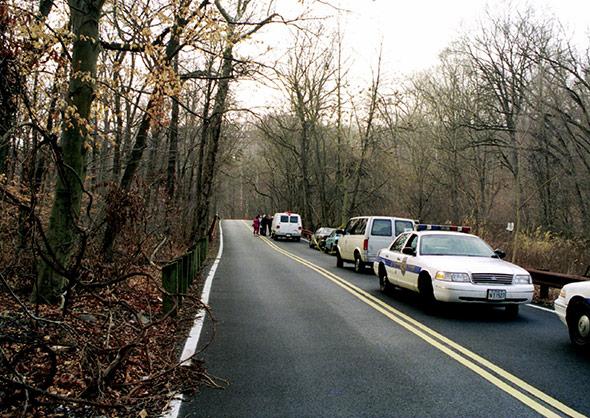I like watching melodramatic Dateline-style TV shows about murder. I particularly enjoy the show Snapped, which is frequently about cases of women who have killed their husbands. What this says about me (and my marriage) is a subject for another day. At the moment, what I’d like to do is compare the true crime TV genre that I know and love to a new podcast from some of the people behind This American Life—an episodic show called Serial, which will follow a single story for 10 to 20 installments per season. Serial’s first season, which launches Friday with the release of two episodes, is about murder.
Specifically, it’s about the murder of Hae Min Lee, who disappeared in 1999 when she was a senior at Woodlawn High School in Baltimore County, Maryland. She was found strangled to death in a city park about a month later. Her ex-boyfriend, a fellow Woodlawn student named Adnan Syed, was convicted of killing her—the account an ex-friend of his gave to the police was crucial—and sentenced to life in prison. He still says he is innocent, and, last year, another friend of his contacted This American Life producer Sarah Koenig, who in a previous job had written about a lawyer in Baltimore who’d been disbarred. The disgraced lawyer had been the one who defended Syed—it was the lawyer’s last criminal trial—and the friend who contacted Koenig wondered if she wanted to investigate Syed’s case to see if it had been botched. She did.
Future seasons of Serial will not necessarily be about crime. And I can’t tell you much more about the plot of Season 1, both because I’ve only heard the first two episodes, and because it would spoil the intrigue of the show. The week-to-week twists of the investigation are the show’s hook. The producers say they’re not sure how its story is going to end because they’re still researching it at the same time that they’re producing episodes. They are also creating the story, in effect: The information they find could have ramifications for Syed’s appeals. In the first episode, they search for a woman whose letters to Syed, never discussed during his trial, suggest an alibi.

Photo courtesy This American Life
Serial isn’t escapist entertainment. We listen a lot to the voice of someone who’s spent 15 years in prison for a crime he says he didn’t commit. Syed calls Koenig collect from prison frequently—an operator announcing one of his calls is the first thing you hear in the series. This season is going to be five to ten hours long in total, and the first two episodes are envelopingly real in a way nothing like Dateline—or even, for that matter, more artful documentaries about crime. Many feature-length depictions of criminal cases make them larger than life: stories of lust gone wrong or greed that tore a family apart that hinge on a few seconds of a jury’s verdict. Serial, too, is about big moments and big questions. But it is also about the gaping spaces between those moments, and about small questions—years in which nothing happens, leads that don’t end up going anywhere, details of evidence law, conflicting memories of the meaning of a minutes-long interaction that happened 15 years ago.
The show gives its subjects and sources room to talk, to fill in the social world that Syed and Hae Min Lee occupied. They were both children of immigrant families, splitting their time and personalities between the traditional worlds of their parents and the less traditional world of ’90s American high school—homecoming dances, weed, computer labs, the track team, aimless drives around town. We learn about friendships, breakups, a relationship between co-workers at a LensCrafters. On Dateline, interviews are lit dramatically and cut for effect; on Serial, though the subjects are engaging and articulate, the interviews seem to ramble casually—memories are discussed over the phone as a subject’s family chimes in, for instance. And that’s not a bad thing. Two episodes in, and I feel like I know these people well.
I don’t, of course. One of them might be a murderer. Or maybe he was railroaded by a very big lie. Someone in the show is not telling the truth about something very sinister. That’s the narrative tension that makes Serial not only compelling but also unlike anything I can remember watching or reading before. The characters feel like people I’ve met; the mundane questions and frustrations of the investigation feel like daily dilemmas we’ve all dealt with. But the stakes are unlike nothing I—or you, probably—can imagine. Serial tells us that sometimes regular-seeming people do terrible things—and then regular people investigate and prosecute those things. Small decisions and vague memories and coincidences and hasty decisions can add up to life and death. And that’s a truth that’s going to stick with me a lot longer than the next tabloid tale of lust or greed that I watch on Dateline.
